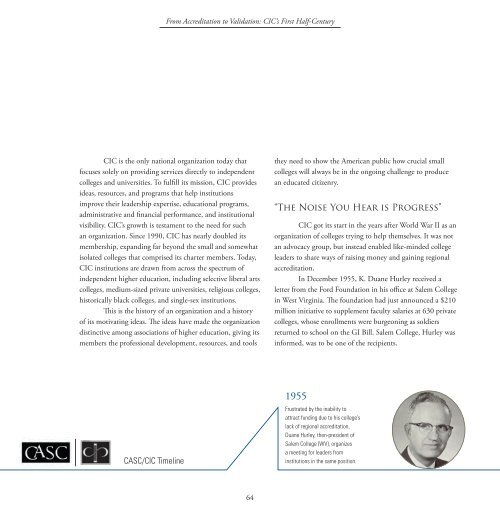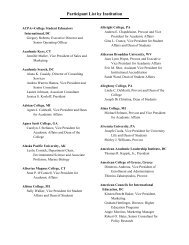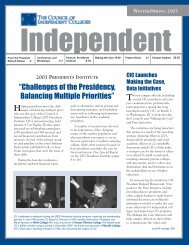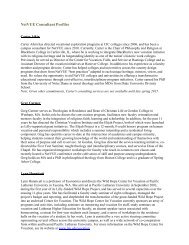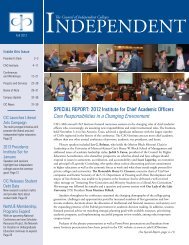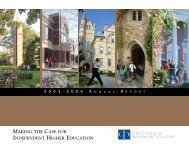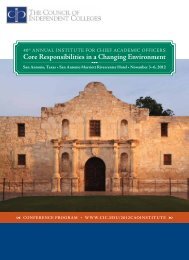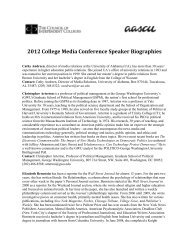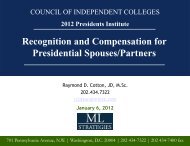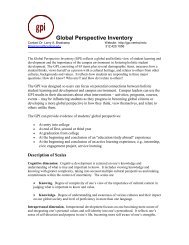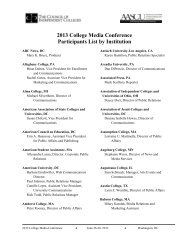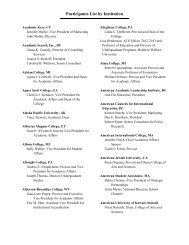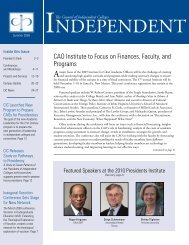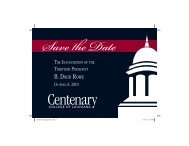Meeting the Challenge: - The Council of Independent Colleges
Meeting the Challenge: - The Council of Independent Colleges
Meeting the Challenge: - The Council of Independent Colleges
You also want an ePaper? Increase the reach of your titles
YUMPU automatically turns print PDFs into web optimized ePapers that Google loves.
From Accreditation to Validation: CIC’s First Half-Century<br />
CIC is <strong>the</strong> only national organization today that<br />
focuses solely on providing services directly to independent<br />
colleges and universities. To fulfill its mission, CIC provides<br />
ideas, resources, and programs that help institutions<br />
improve <strong>the</strong>ir leadership expertise, educational programs,<br />
administrative and financial performance, and institutional<br />
visibility. CIC’s growth is testament to <strong>the</strong> need for such<br />
an organization. Since 1990, CIC has nearly doubled its<br />
membership, expanding far beyond <strong>the</strong> small and somewhat<br />
isolated colleges that comprised its charter members. Today,<br />
CIC institutions are drawn from across <strong>the</strong> spectrum <strong>of</strong><br />
independent higher education, including selective liberal arts<br />
colleges, medium-sized private universities, religious colleges,<br />
historically black colleges, and single-sex institutions.<br />
This is <strong>the</strong> history <strong>of</strong> an organization and a history<br />
<strong>of</strong> its motivating ideas. <strong>The</strong> ideas have made <strong>the</strong> organization<br />
distinctive among associations <strong>of</strong> higher education, giving its<br />
members <strong>the</strong> pr<strong>of</strong>essional development, resources, and tools<br />
<strong>the</strong>y need to show <strong>the</strong> American public how crucial small<br />
colleges will always be in <strong>the</strong> ongoing challenge to produce<br />
an educated citizenry.<br />
“<strong>The</strong> Noise You Hear is Progress”<br />
CIC got its start in <strong>the</strong> years after World War II as an<br />
organization <strong>of</strong> colleges trying to help <strong>the</strong>mselves. It was not<br />
an advocacy group, but instead enabled like-minded college<br />
leaders to share ways <strong>of</strong> raising money and gaining regional<br />
accreditation.<br />
In December 1955, K. Duane Hurley received a<br />
letter from <strong>the</strong> Ford Foundation in his <strong>of</strong>fice at Salem College<br />
in West Virginia. <strong>The</strong> foundation had just announced a $210<br />
million initiative to supplement faculty salaries at 630 private<br />
colleges, whose enrollments were burgeoning as soldiers<br />
returned to school on <strong>the</strong> GI Bill. Salem College, Hurley was<br />
informed, was to be one <strong>of</strong> <strong>the</strong> recipients.<br />
CASC/CIC Timeline<br />
1955<br />
Frustrated by <strong>the</strong> inability to<br />
attract funding due to his college’s<br />
lack <strong>of</strong> regional accreditation,<br />
Duane Hurley, <strong>the</strong>n-president <strong>of</strong><br />
Salem College (WV), organizes<br />
a meeting for leaders from<br />
institutions in <strong>the</strong> same position.<br />
64


